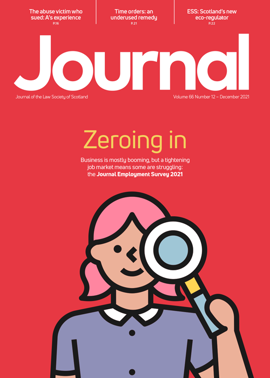President's column
“So, this corroboration thing, isn’t that just a trick that lawyers use to get their clients off?”
Scotland’s 2021 Government has announced an ambitious plan to consider and consult on a raft of potential changes to the way in which allegations of crime are treated and prosecuted. It was inevitable that the requirement of corroboration would come under the spotlight. I know, we have been here before – remember the Carloway report and the Bonomy report – but bear with me.
In the context of a recent ministerial round table, I thought it would be instructive to check what Renton and Brown had to say on the subject of corroboration. Interestingly, there is so much more said about what corroboration doesn’t require, than actually to explain the basic notion that no single witness or source of evidence will be sufficient to base a conviction for any crime or offence, unless, of course, the legislature decides otherwise. Any criminal court practitioner will be able to point to a series of Appeal Court decisions that, if not exactly diluting the need for supporting evidence, certainly innovate on the ways in which that evidence can be seen to exist.
Corroboration is a feature of probably all systems of criminal justice. Prosecutors the world over want to show the fact finders that their cases are compelling, so the more cohesive case with multiple strands of evidence all pointing in the one direction will be the ideal. Scotland, it appears, is unique in requiring it.
Delicate balance
The interests of justice involve a delicate, and sometimes difficult, balance between competing interests. On the one hand, there is the public interest in the prosecution of crime. Tied in with that are the interests of complainers and, yes, that would include those who have been the victims of crime. On the other hand, there is the interest of the accused – and given my acknowledgment of the concept of a “victim” that must surely include the interests of those wrongly accused of crime. And while I acknowledge that the public interest is served by the prosecution of crime, let’s not forget that the conviction of the innocent would surely run contrary to the public interest in any civilised society.
The Supreme Court’s 2010 Cadder decision meant that suspects could no longer be interviewed, and that confessions made by these suspects would remain inadmissible in evidence, without them having been offered access to legal advice. Consequently, Lord Carloway was tasked with considering the place of corroboration in a modern system of criminal justice. The conclusion of his report was to the effect that the requirement for corroboration was “archaic” and “holding back” Scotland’s criminal justice system. Holyrood’s then Justice Committee didn’t agree. “Disdainful and dismissive” of a centuries old practice that had served the country well, was how the Scotsman reported their view on his report.
So what has changed? What is out of balance now? And what else would have to change if corroboration, as a requirement for conviction, was to go?
Frankly I don’t have an answer to either of my first two questions. As for the third, although sheriffs know and juries are told that a conviction currently requires credible, reliable, corroborated evidence to a standard of proof beyond reasonable doubt, when it comes to a jury verdict, a bare majority of eight to seven will be enough for a conviction. Historically, that has been accepted as something of a balance in a system that requires corroboration, but if that requirement goes, maybe a bare majority will no longer look like proof beyond reasonable doubt.
Against our interests?
But wait, never mind the interests of justice: if corroboration was to go, would that not be good for the legal profession? Might we see an increase in prosecution numbers – and a rise in those appealing convictions because they are aggrieved at coming out on the losing side in the game of “You did it, no I didnae”? Probably, yes. So let’s hope that the current Criminal Justice Committee, the Parliament and Government take seriously the arguments to keep corroboration that are clearly contrary to the self interests of the profession.
Regulars
Perspectives
Features
Briefings
- Criminal court: OLRS – life means life
- Corporate: Will a deal impact on national security?
- Intellectual property: IP and AI – the latest
- Agriculture: Securing successor crofting tenant status
- Succession: Back of an envelope – testamentary intent?
- Scottish Solicitors' Discipline Tribunal
- Data protection: Google off the hook
- Property: Beautifully presented tedium
- In-house: Lawyers in uniform
In practice
- Your Law Society of Scotland Council members
- Legal services regulation reform – have your say
- The Word of Gold: Whither goest thou?
- Coaching: help in a fast changing world
- The earlier the better
- Family mediation accreditation: a view from the panel
- The Eternal Optimist: Just to say thanks…
- Appreciation: Albert Vincent Sheehan
- Ask Ash: A broken work circle







